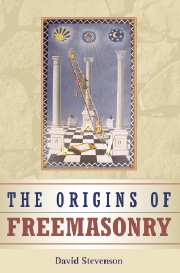Book contents
- Frontmatter
- Contents
- List of plates
- Preface
- List of abbreviations and conventions
- 1 Introduction
- 2 The Medieval contribution
- 3 William Schaw, master of works and general warden
- 4 The Sinelairs of Roslin and the masters of works
- 5 The Renaissance contribution
- 6 Rituals of identification and initiation
- 7 Sir Robert Moray: masonry, symbolism and ethics
- 8 The early Scottish lodges
- 9 Early Scottish and English freemasonry
- Appendix: Early (pre-1710) masonic lodges in Scotland
- Bibliographical note
- Index
- Plate section
3 - William Schaw, master of works and general warden
Published online by Cambridge University Press: 06 July 2010
- Frontmatter
- Contents
- List of plates
- Preface
- List of abbreviations and conventions
- 1 Introduction
- 2 The Medieval contribution
- 3 William Schaw, master of works and general warden
- 4 The Sinelairs of Roslin and the masters of works
- 5 The Renaissance contribution
- 6 Rituals of identification and initiation
- 7 Sir Robert Moray: masonry, symbolism and ethics
- 8 The early Scottish lodges
- 9 Early Scottish and English freemasonry
- Appendix: Early (pre-1710) masonic lodges in Scotland
- Bibliographical note
- Index
- Plate section
Summary
The life of William Schaw
Major building projects, in Scotland as elsewhere, were usually under the control of a master of works, who was in charge of administrative and financial affairs, while the technical supervision and organisation was in the hands of the master mason. The separation of functions was not a rigid one, however, for masters of works were often men with particular expertise and interest in architecture and sometimes took an active part in designing buildings. In the early sixteenth century the kings of Scotland began to appoint principal masters of works, with responsibility for all royal castles and palaces for life, in place of (or in addition to) temporary masters for specific buildings. On 21 December 1583 William Schaw was appointed to the office, as ‘grit maister of all and sindrie his hines palaceis, biggingis and reparationis, and grit oversear, directour and commandar’ of such operations for life.
Details of Schaw's life are sparse, and much of what is known is derived from the Latin epitaph placed over his tomb in Dunfermline Abbey (see plate 1) after his death in 1602. In translation it reads as follows:
To God most Holy and most High. Beneath this lowly pile of stones lies a man illustrious for his rare experience, his admirable rectitude, his unmatched integrity of life, and his consummate qualities, William Schaw, the King's Master of Works, Master of the Ceremonies, and Chamberlain to the Queen.[…]
- Type
- Chapter
- Information
- The Origins of FreemasonryScotland's Century, 1590–1710, pp. 26 - 51Publisher: Cambridge University PressPrint publication year: 1988
- 1
- Cited by



